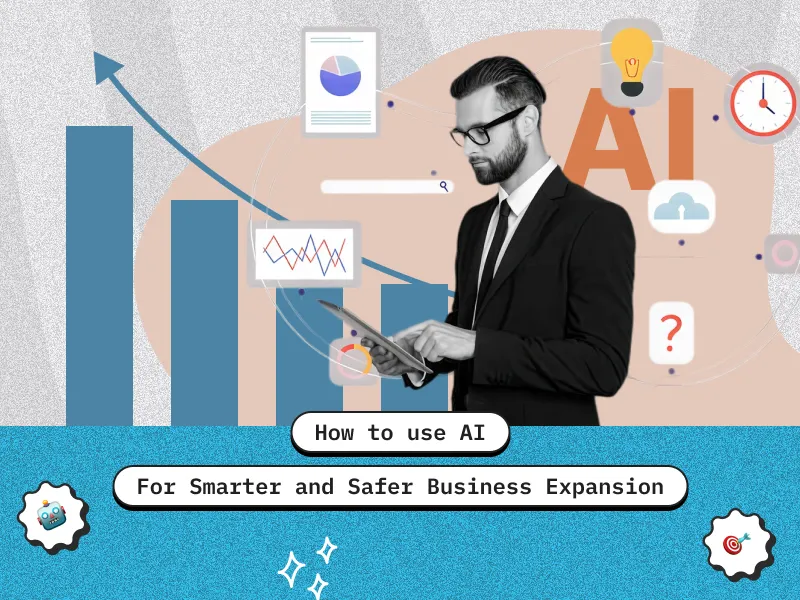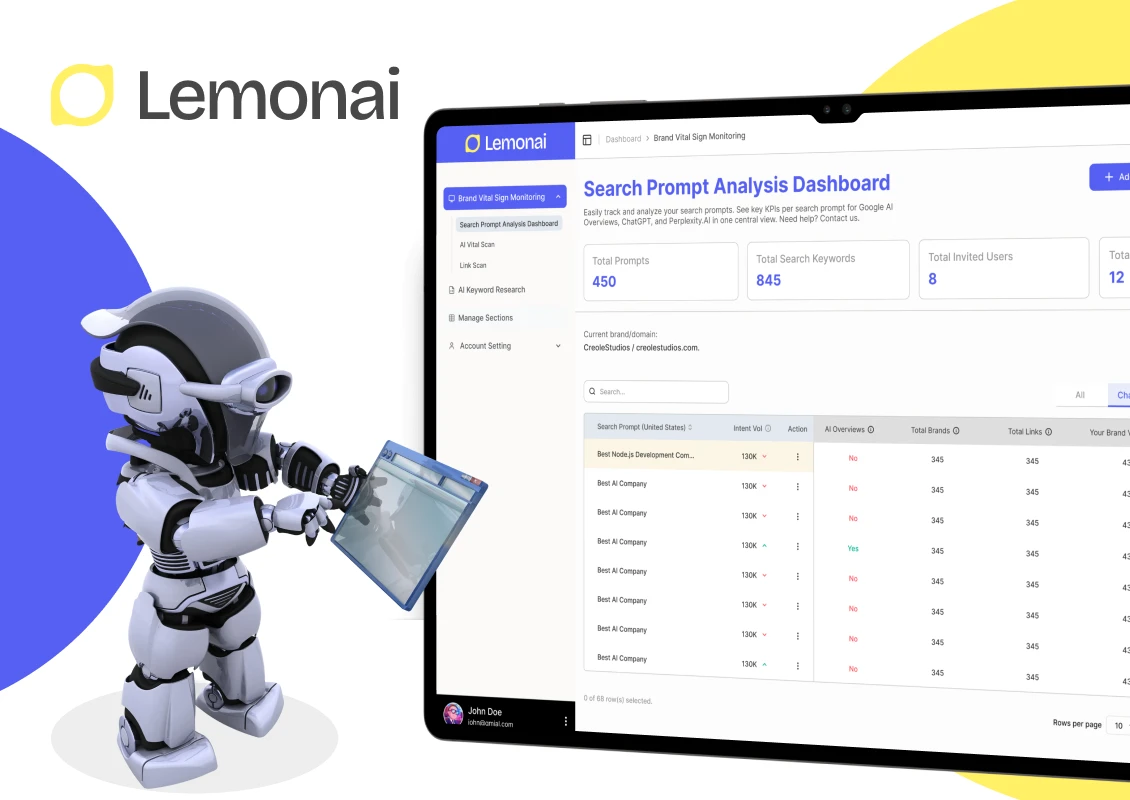TL;DR
- AI enables smarter and safer business expansion.
- It improves market analysis and helps identify new opportunities.
- AI tools enhance regulatory and environmental compliance, including detecting risks like AFFF contamination.
- Supports better technology integration and digital infrastructure planning during growth.
- Predictive AI analytics help identify, quantify, and mitigate risks before they escalate.
- AI optimizes and personalizes customer experience, increasing satisfaction and loyalty.
- Rapid AI adoption allows businesses to expand more strategically and adaptively.
Introduction
In today’s fast-changing global environment, businesses are turning to innovative strategies that support growth while ensuring operational security. Artificial intelligence (AI) is proving to be a powerful catalyst, helping organizations expand more strategically and safely.
According to McKinsey & Company, AI adoption is rising quickly. 78% of companies now use AI in at least one business function, up from just 55% a year ago. As generative AI becomes more integrated, businesses are rethinking workflows, improving governance structures, and addressing potential risks head-on.
The sharp increase in AI use highlights its growing role in streamlining operations, guiding smarter decisions, and reinforcing long-term resilience. This shift signals a new era of business expansion, one where intelligent technologies accelerate growth and create safer, more adaptive organizational models.
This article explores how AI can support smarter, safer business expansion through improved planning, risk mitigation, and strategic implementation.
AI-Driven Market Analysis and Opportunity Identification
Artificial intelligence is transforming how businesses analyze markets and uncover growth opportunities. AI-powered systems process vast datasets, ranging from consumer behavior and economic indicators to social media sentiment and competitor activity, to deliver predictive insights.
Generative AI (gen AI) is driving profound shifts in market research, according to Columbia Business School. It enhances current practices, fills existing data gaps, and is even capable of creating entirely new sources of insight. Companies can now leverage synthetic data to test assumptions, pilot strategies, and guide decisions that previously lacked empirical support due to budget constraints.
AI also enables continuous market monitoring and timely alerts, giving companies a critical edge in fast-changing environments. Its natural language processing tools can extract actionable intelligence from unstructured sources like reviews and news.
With 81% of companies using or planning to use generative AI for market listening, the technology is seeing rapid adoption across industries. As organizations invest in Generative AI Development, it is becoming an “always-on” tool for spotting hidden trends, identifying niche segments, and uncovering new opportunities for innovation and growth.
Environmental and Regulatory Compliance Intelligence
Expanding into new markets requires careful navigation of environmental and regulatory complexities, which vary by region. AI-driven compliance intelligence offers powerful tools for monitoring evolving environmental standards and regulatory obligations. These systems help businesses stay informed about shifting policies, enforcement patterns, and jurisdiction-specific compliance requirements.
Environmental compliance has grown especially vital amid rising scrutiny over sustainability practices. AI can analyze environmental data to identify risks, including contamination concerns. One notable example is AFFF (Aqueous Film-Forming Foam) contamination—a serious issue when considering facility locations.
According to TorHoerman Law, AFFF, used to fight fires involving flammable liquids, contains PFAS chemicals that persist in the environment and the human body. Prolonged exposure has been linked to cancers and immune or thyroid disorders.
AI tools help businesses evaluate AFFF contamination risks early in site selection, factoring in cleanup costs and legal exposures. This is especially important given the growing attention surrounding the AFFF foam lawsuit, which underscores the need for accurate environmental intelligence.
Technology Integration and Digital Infrastructure Planning
In today’s digital landscape, successful business expansion hinges on robust technology integration and strategic digital infrastructure planning. AI significantly enhances this process by evaluating existing systems, forecasting future demands, and identifying efficient strategies for scaling operations across new markets.
AI-powered infrastructure planning incorporates factors such as user behavior, data flow, and scalability requirements to create streamlined, cost-effective technology frameworks. These systems can simulate deployment scenarios, assess potential outcomes, and detect performance bottlenecks before they pose real-world challenges.
Moreover, AI supports digital transformation during expansion by analyzing employee interaction with new technologies. It also helps predict adoption barriers and identify areas that require training or process refinement. This ensures smoother transitions and minimizes disruption to operations.
Risk Assessment and Mitigation Through Predictive Analytics
Business expansion inherently carries significant risks, from market uncertainty to regulatory hurdles. AI-powered predictive analytics offer sophisticated capabilities to identify, quantify, and mitigate these threats proactively. These systems analyze historical patterns, current market conditions, and external factors to predict the likelihood and impact of various risk scenarios.
As Forbes highlights, technology, particularly predictive AI tools, is crucial for enhancing the speed and accuracy of risk management. Advanced data analytics and machine learning algorithms process a vast amount of information, identifying potential risks before they escalate.
For example, in cybersecurity, predictive analytics help identify potential breaches in advance, allowing organizations to respond proactively. In the financial sector, algorithms examine past trends and market indicators to detect high-risk investment opportunities.
This proactive approach allows businesses to address potential problems before they impact expansion initiatives, significantly reducing costly mistakes and maintaining momentum.
Customer Experience Optimization and Personalization
AI empowers businesses to deliver tailored, efficient customer experiences, offering a critical edge when entering new markets. Machine learning algorithms analyze customer behavior, preferences, and interactions to create personalized touchpoints that increase satisfaction and brand loyalty.
Research from IBM highlights that AI-powered tools such as chatbots, virtual agents, and smart routing systems enhance customer service. In particular, advancements in AI Chatbot Development make it possible to apply natural language processing (NLP) and machine learning (ML) to understand and respond to customer needs in real time.
These systems not only respond instantly but also improve continuously, learning from each interaction to offer increasingly refined experiences. AI tools can also adapt communications to local languages and cultural nuances, ensuring a more authentic and resonant connection with regional markets.
Globally, 62% of executives believe generative AI can revolutionize experience design, with personalization at its core. Generative AI goes further by delivering proactive solutions and tailored recommendations, enhancing engagement and solving issues, especially during critical expansion phases.
Conclusion
As AI technologies continue to evolve and become more sophisticated, their value in supporting business expansion will only increase. Companies that effectively leverage AI for expansion planning will be better positioned to succeed in increasingly competitive and complex global markets.
The future of business expansion relies on AI technologies that enhance human decisions through data-driven insights, predictive analytics, and automation.
FAQs
- How can small businesses afford AI for expansion planning?
Small businesses can afford AI for expansion planning by leveraging affordable cloud-based AI tools, using open-source platforms, and partnering with AI service providers. Grants and government programs help reduce upfront costs. Scalable subscription models also allow gradual adoption while aligning with specific growth strategies.
- What business will benefit most from AI?
Businesses that manage large volumes of data, such as retail, finance, healthcare, and logistics, benefit most from AI. AI enhances decision-making, streamlines operations, personalizes customer experiences, and improves forecasting. Companies with digital infrastructures already in place can leverage AI to drive innovation, boost efficiency, and gain a competitive market advantage.
- Can AI create a successful business?
AI can play a crucial role in creating a successful business by automating tasks, analyzing data for smarter decisions, and enhancing customer experiences. It helps identify market trends, optimize operations, and reduce costs. However, human vision, strategy, and adaptability remain essential for long-term business success alongside AI.











 30 mins free Consulting
30 mins free Consulting 
 11 min read
11 min read 


 Canada
Canada 
 Hong Kong
Hong Kong 





 Love we get from the world
Love we get from the world 